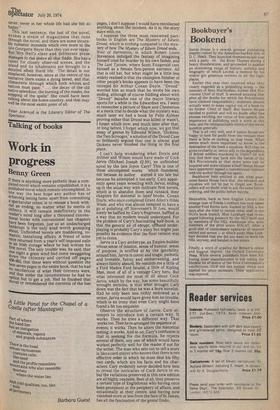Talking of books
Work in Progress
Benny Green
If there is anything more pathetic than a completed novel which remains.unpublished, it is a Published novel which remans uncompleted. In one way the best hope any author has of achieving lasting fame, apart from committing a spectacular crime, is to release a book without an ending, no matter what its merits or defects, it will remain indefinitely in the reader's mind long after a thousand conventional books with conventional last chapters have been forgotten, just as an undischarged bankrupt is the only kind worth gossiping about. Unfinished novels are maddening, romantic, tantalising affairs. A friend of mine 0. nce returned from a year's self-imposed exile IP an Irish cottage where he had written his first novel. The only trouble was, he said, that b..,ne night a great wind had come swaggering down the chimney and carried off pages .456-462, that these were without question the best seven pages in the entire book, that he had no recollection of what their contents were, and that Under the circumstances he had no option but to get a job. Had he finished that Move! or remembered the contents of the lost
pages, I don't suppose I would have recollected anything about the incident. As it is, the story stays with me.
I suppose the three most renowned partbooks in English are The Mystery of Edwin Drood, which is nothing compared to the mystery of how The Mystery of Edwin Drood ends, Weir of Hermiston, in which Robert Louis
Stevenson indulged the fantasy of imagining himself tried for murder by his own father, and
The Last Tycoon, where Scott Fitzgerald cast
himself as a female first-person narrator, All that is old hat, but what might be a little less widely realised is that the champion finisher of other people's books appears to have been the intrepid Sir Arthur Conan Doyle. "Drood" worried him so much that he wrote his own ending, although of course fiddling about with "Drood" becarhe one of the major literary sports for a while in the Edwardian era. I seem to remember a picture of Shaw and Chesterton at a mock trial to decide what the mystery was; much later we had a book by Felix Aylmer proving either that Drood was killed or wasn't, I forget which now, and much later after that, or long before, I forget which now, we got that essay of genius by Edmund Wilson, 'Dickens, the Two Scrooges,' a solution of the Drood Case so brilliantly argued that one is almost glad Dickens never finished the thing in the first place.
I can't help wondering what Doyle and Aylmer and Wilson would have made of Cock Jarvis (Michael Joseph £2.50), an unfinished novel by the late Joyce Cary? This is one of those uncompleted works. which foundered,
not because its author started it too late but
because he attempted it too early. Cary apparently spent years wrestling with Jarvis, ending
up in the usual way with inchoate first novels, which is to abandon them and ransack their chapters for material in later books. Conan
Doyle, who once completed Grant Allen's Hilda Wade, and who was almost tempted to have a go at polishing off Stevenson's St Ives, would
surely be baffled by Cary's fragment, baffled in a way that no modern would understand. For the problem of Cary's fascinating half-book, is that the general air of abrupt, offhand underplaying is probably Cary's irony but might just possibly be evidence that the final version was yet to come. Jarvis is a Cary archetype, an Empire-builder whose sense of mission, sense of honour, sense of purpose, is scoffed at by the ignobility around him. Jarvis is comic and tragic, pathetic and loveable, funny and embarrassing, and always faintly absurd. He reminds me a little of a Ford Madox Ford fatalist, a little of Kipling Man, most of all of a vintage Cary hero. But what interested me most of all about Cock Jarvis, which by the way, has some beautifully wrought sections, is that what brought Cary down was the fact that he was a born novelist. Had he only been less richly endowed as a writer, Jarvis would have given him no trouble, which is an irony that even Cary might have found a bit too exquisite. Observe the structure of Jarvis. Cary attempts to introduce him a certain way. It works. Then he tries a different way. That works too. Then he re-arranged the sequence of events; it works. Then he alters the historical setting; it works. And so on. Cary's confusion is that in seeking for the formula, he rejects several of them, any one of which would have worked perfectly well for the reader if not for the writer. The man who sets out to tell a story is 'like a card-player who knows that there is one effective order in which he must deal his fifty two cards, which are his facts and his char
acters. Cary evidently never decided how best to reveal the intricacies of Cock Jarvis to us,
but the variations preserved in this new edition are all highly readable. Best of all, they preserve a certain type of Englishman who having once been prominent at the periphery of affairs, and occasionally at their centre, and having now vanished more or less from the face of St James, has all the fascination of the genial Dodo.


































 Previous page
Previous page